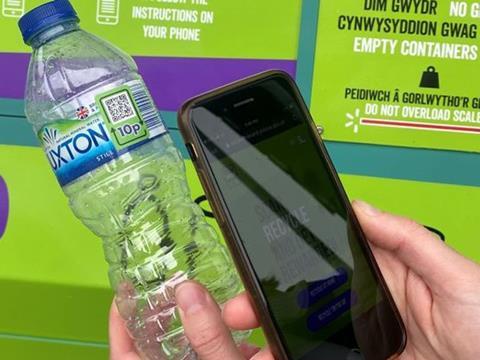
In a ‘first-of-its-kind’ recycling trial, consumers in the small Welsh town of Brecon can use smartphones to scan a beverage container’s label or sticker for a monetary reward, according to a report in the USA’s Packaging Digest. One of the major brands participating in the trial is Nestlé Waters UK. It runs for 12 weeks from July 13 to October 4, 2023.
Those living and working in the town— with a population of just 8,000-plus — can participate in a scan, recycle, reward digital deposit return scheme (DDRS) trial. This follows the announcement recently of a similar scheme by online supermarket Ocado, as reported here.
The scheme involving Nestlé Waters is a broad-based trial across drink containers and material types that include glass, metal, and plastic PET bottles as well as paperboard cartons. The trial is designed to test how digital technology can be used to encourage more recycling.
The program encourages consumers to claim 10p (12 euro cents) rewards for recycling each eligible container by scanning a special QR code on the label or sticker with their mobile phones. There are three options for how consumers can recycle the containers: They can recycle at home; use bins in two locations around the town; or hand containers over-the-counter to staff at select stores.
All single-bottle sizes of Buxton brand natural mineral water, the largest brand in the UK, are eligible for the program. Last year the brand achieved its commitment to have the full bottle range made with 100% recycled PET plastic. Nestlé Waters UK reports it has significantly reduced the amount of virgin PET plastic used to make its bottles, helping to close the recycling loop.
The DDRS trial is being led by the DDRS Alliance, in partnership with the Welsh Government, WRAP Cymru, Powys County Council, and local retailers.
“We are excited to work on this large-scale digital Deposit Return Scheme trial,” says Hayley Lloyd House, head of corporate affairs and sustainability at Nestlé Waters UK. “It’s a great opportunity for us to understand how digital solutions may be incorporated into a deposit return scheme and how a digital recycling solution can engage with consumers regarding the bottle-to-bottle circular economy journey to help increase recycling rates further.
“Effective and efficient deposit return schemes have demonstrated that they can help increase the availability of high-quality, food-grade recycled plastic for drinks containers. We hope this trial could inform the development of DRS across the UK,” she added.
In addition to the monetary and environmental benefits, some consumers may be motivated to participate through a benevolent option. Cllr Jackie Charlton, cabinet member for a Greener Powys, says, “Although completely voluntary, we are hoping that as many people as possible join in with this exciting trial and benefit from the cash rewards on offer. For every container scanned and recycled correctly, participants will have the choice to ‘cash in’ their reward or donate it to the Brecon Food Bank and the Wildlife Trust of South and West Wales, our two nominated local charities.
“This trial will help us understand people’s preferred return options for recycling these drinks containers and help us learn more about recycling behaviour. This will be the first time anywhere in the world that a whole town will use this new technology and the findings will be analysed and shared with the rest of the UK,” he said.
This article was created in collaboration with AIPIA (the Active and Intelligent Packaging Industry Association). For a full update on active and intelligent packaging, come along to the AIPIA World Congress (co-organized by Packaging Europe) in Amsterdam on 14-15 November. The only smart packaging event covering the entire technology spectrum, the World Congress is a meeting place for the global active and intelligent packaging industry where brand owners, innovators, and other stakeholders can network and see and discuss the latest trends and innovations. Register to attend here.














No comments yet